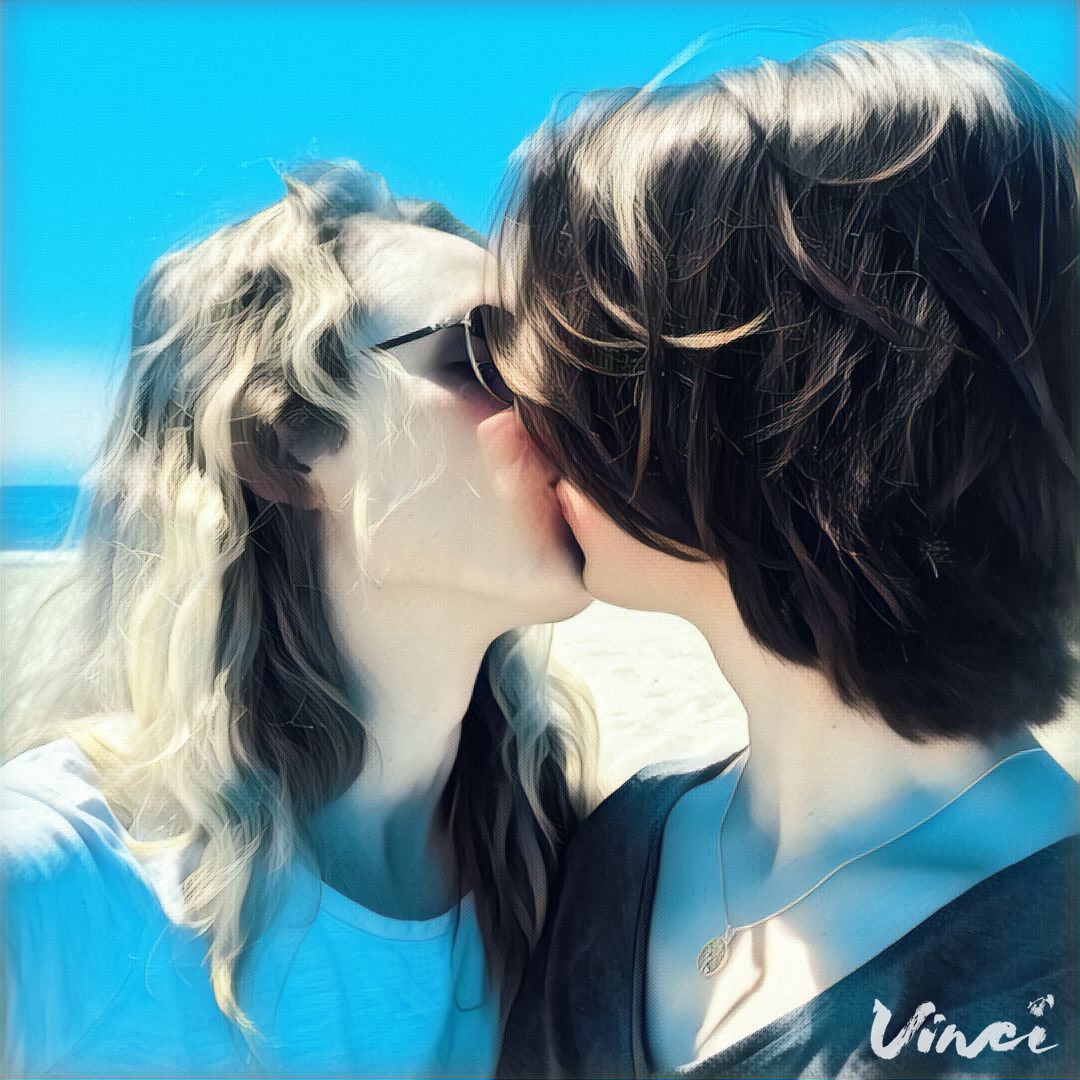t4t is known for being a Craigslist hookup forum (that FOSTA killed ? thanks Congress) for crossdressers and trans folks to get it on with each other.
 Jacqueline and I goofing off in L.A.
Jacqueline and I goofing off in L.A.
Although it has a seedy connotation, I?ve been starting to rethink the conceptual potential of t4t as a framework for understanding trans liberation. Why should t4t be seedy? If we truly believe the meaning behind Laverne Cox?s hashtag #transisbeautiful then logically we should believe that t4t is beautiful.
I therefore propose we depornify and desexualize t4t.
This thought has been percolating for awhile but my most recent relationship with Jacqueline has stirred up these feelings again(who I asked for her permission before outing her as trans, something you should ALWAYS do even if they broadcast it on their own social media ? it?s about having control over our own narrative).
In this essay, I want to explore the possibilities surrounding t4t as symbol for a trans separatist politics, an ideological sister to the old feminist politics of lesbian separatism but with a new trans-liberatory twist. But instead of a politics centered on genitals, chromosomes, and the social experiences unique to cis women, t4t will be focused on trans folks coming together to invert the set of rules, norms, and expectations inherent to a gender binary enforced by cis people ? the very binary that says gender is immutable and fixed at birth based on superficial morphological features, the binary that leads to BS like the so-called ?Free Speech Bus? , pushing the message that ?Boys are boys ? and always will be. Girls are girls ? and always will be.?
A c4c (cis for cis) relationship is so ingrained in our minds as being ?normal? that t4t is harder to see as equally valid, and not just valid, something in which two people could truly thrive.
Decades ago, when psychiatrists and scientists studying trans people were developing measures for assessing the ?success? of transition, the only relationship that counted as ?successful? was being in a relationship with a cis person of the opposite sex. Any other relationship configuration and you literally lost points and your transition was deemed ?less successful?.
That?s why t4t is political.
People usually react to trans people being with other trans people almost with a sense of pity, as if that?s the ?best we can do?: settle for a fellow freak. People assume that our ultimate goal is to be with a cis person, to use their attraction to us to validate our identity; if a cis lesbian is attracted to me I must ?really? be a woman! That sentiment is part of what makes t4t inherently political: it rejects the framework through which cis attraction validates our genders.
Furthermore, c4t itself is not without its potential problems. Cis people, men and women, can fetishize trans people for our bodies as well as ?third-gender? us, being attracted to us as ?exotic? or ?interesting? but not quite accepting us at face value for who we are, or worse, having that attraction deflate post-orgasm indicating the attraction itself was fundamentally objectifying and a product of horniness rather than genuine attraction. While it?s OK to struggle with internalized transphobia (I do it everyday), it?s not OK to fail in our duty to interrogate our implicit biases and work to develop strategies that ensure these biases don?t harm others.
So many of the narratives surrounding trans lives focus solely on our anguish, whether from our own dysphoria or from the marginalization we face at the hands of society, being seen as jokes suitable for throwaway comedy lines or memeification but rarely as full-blooded people with our own hierarchy of needs.
the personal is political
t4t is political because it aims to show how joyful trans lives can be apart from the society that has such a hard time understanding us.
 love on Venice Beach
love on Venice Beach
But of course we can never truly be apart from society. The best we can do is form little nests and enclaves, little spheres of relative safety, places where we don?t have to worry about being anybody but ourselves, places where we do not feel ourselves to be the 1%, the minority, the Other ? places where we are ?normal?. Perhaps these spaces can only exist in fleeting moments and are never truly realized but my brain is able to take those disparate moments and stitch them together into a continuous memory/feeling, a feeling that is joyous and oriented towards the future.
for me t4t represents a liberatory movement, focused on the advance of trans rights and our place within society. But the task of changing a deeply cis-normative society is so daunting, so overwhelming, that part of self-care is retreating into the solace of our own company, our own little queer/trans communities.
t4t is about solidarity. I want to make space to support trans lives, businesses, start-ups, relationships, artists, communes, spaces, political organizations, politicians, movements, etc.
t4t is by trans, for trans.
It is community. But most importantly, it is love ? love for ourselves, for our trans experience, for our existence ? finding joy despite the pain, despite the hardship, feeling intensely those moments when we are truly affirmed in being ourselves.
While it nice to have the validation from the cis world, it almost always comes too late. The validation always comes after the lifelong internalization of transphobic messages we see constantly promulgated in the mainstream media, the numbing regularity of TERFism being splashed across op-ed pages and uttered from prominent feminists, the bullying and torment trans youth receive from their peers, the feelings of shame and guilt fostered by overly conservative parents, etc., .etc. The messages are abundant and they are clear: choose to be openly trans at your own risk.
the strange loop of trans lesbians
I have dated, hooked up with, and/or been in serious relationships with people of pretty much all genders: cis women, cis men, trans women, cross dressers, enbies, and trans men. My current partner is another trans girl.
 Just grabbing lunch together ?
Just grabbing lunch together ?
During this time, I?ve developed a theory about trans lesbian (transbian) relationships: they are strange loops, our sexual orientation endlessly flipping back and forth in transphobe?s minds like the liar?s paradox: gay, straight, gay again, now straight, gay, etc., etc.
The idea is that a true transphobe is going to think a ?trans lesbian?, aka a trans woman into other women, is really just a deluded, ?straight male?. And straight males are into females, right? Well, the transphobe will also see my partner as a male, making us two ?gay males?, not two ?straight males?. But if we?re not straight, then we must be into men. But we are now admittedly mostly into other women (with some exceptions). So the transphobe can?t make sense of our orientation without recognizing the validity of our gender.
Another thing I?ve thought a lot about is whether being with another trans person helps or amplifies dysphoria. In a very real way, it definitely helps. We don?t have to worry that our partner isn?t going to understand our dysphoria. We can vent about cis people, misgendering, anxiety, etc., without censure. My love for her body helps me love my own body. But precisely because our shared understanding has created a mutual vulnerability I wonder if perhaps we enable ourselves to feel our dysphoria on a deeper, more intense level.
And I?m going to get real now: being in a relationship with a dysphoric person is not easy. Being dysphoric is not easy. It?s like a tiny little knife in your gut that you know won?t ever go away unless you kill yourself. Which sounds dramatic. But it?s really not: the suicide rates for trans people make one stop and question: is it really the dysphoria or the combination of dysphoria and a cruel, hostile, transphobic, and unforgiving world?
Yes, there are good cis people (#notallcispeople) out there. Good allies and good friends to the trans community. I know many of them personally. But cis normativity and the corresponding cis sexism that arises out of it are deep, institutional structures/systems in our society. It?s not just going to go away anytime soon and despite all the progress there are significant numbers of people who are skeptical about very basic stuff, like believing we are who we say we are: that trans women are women, trans men are men, and nonbinary people are real.
The pains of our experience are also what give the joys of t4t a brighter finish. When we can share our happiness together, standing side-by-side, it?s easy to adopt a kind of ?take on the world? attitude, more specifically ?take on the cis world? attitude. And I recognize that an adversarial attitude is not necessarily conducive to political allyship. But it?s a venting mechanism. It?s a way of engaging in radical self-care. Sometimes I just don?t have the energy to care about being the perfect exemplar of political bridge-building. Hating cis people for propagating the implicit biases that structure the institutional biases against us is not done out of malice ? it?s done in order to cope, to make peace with our existence.
And furthermore, it fits into the general rule-of-thumb: always punch up. If you?re going to shit on a group of people for comedic/venting/healing purposes it?s always best to go after those with more privilege than you, those who sit in a higher place in the social hierarchy. This general principle of comedy works for pretty much all intersections of privilege. When in doubt of whether a group has ?more privilege? (which assumes this can be actually quantified) it?s probably best practice to just go ?higher? until you find a group that clearly has boatloads more privilege than you.
living as half a percentage point
Most estimates put the prevalence of trans people around .5?1% of the population.

Half a percentage point. You just kind of get used to being the only trans person in a room after a while. Tokenization is the inevitable outcome of being such a small minority. In effect, you become known as the resident expert on all things LGBTQI+. And, in reality, you probably are the expert. But you?re likely the expert on other things as well. But you become known as the ?tranny expert?, the person to be consulted anytime they see a gay person on TV or anything else loosely connecting to your own experience. Tokenization happens when someone randomly tells me how much they ?LOVE Ru Paul?s Drag Race!!!? as if I should, as a trans woman, be intrinsically connected to the experience of drag queens.
But I think besides the tokenization, the most impactful aspect of being an extreme statistical minority is the overwhelming sense of isolation I sometimes feel in the cis world. And that right there gives t4t relationships a special significance for me. I just feel less lonely in a deep, existential sense. I think it?s why trans/queer people often surround themselves with other trans/queer people: it?s a coping mechanism for being on the fringes of society. And the fridge itself just not just economic or social, it?s a philosophical fringe: it?s being on the margins of intelligibility.
Despite being on the fringes of society, it?s not like I am not in society. I am in society. I am writing this in my house, which sits in the middle of a city. I go to work everyday. I go to the grocery store, drink coffee at the local Starbucks. How could I not be in society? Yet I am outside of it. Half a percentage point. It?s kind of unsettling walking around sometimes knowing that there is a large percentage of people around me that would probably think I am delusional for just existing the way I want to exist.
concluding thoughts
In the end, t4t is political because the micro-personal is the macro-political. When trans people flourish in their relationships with other trans people, the very existence of our happiness stands in opposition to the implicit assumption of a cis-sexist society, that trans identity is inferior and cannot possibly live up to the full-fledged moral-political life of cis identity.
t4t rejects all this and puts forward a radically positive message:
#Transisbeautiful



